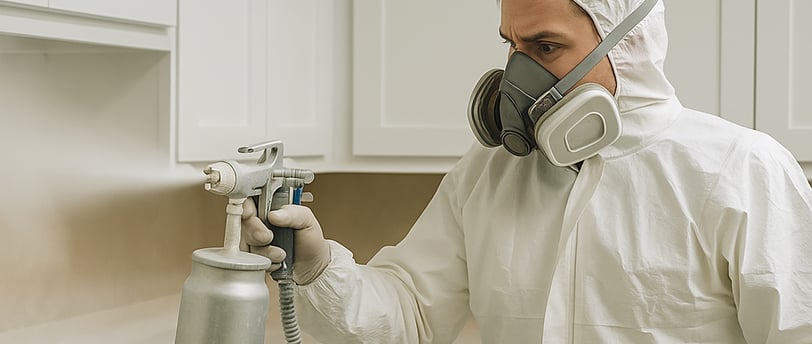Spray or Roller? Choosing the Right Painting Method for Your Project
Spray vs roller? Learn pros, cons, finish quality, cost, and when each is better. A practical painting guide for your home or office.
PAINTING TECHNIQUES
Pure Perfection London
6/13/20252 min read


Spray or Roller? Choosing the Right Painting Method for Your Project
When planning an interior painting project, one of the most common questions clients ask is:
"Should I choose spray painting or traditional roller application?"
Each method has its strengths and is suited for different types of spaces. In this article, we’ll break down the pros and cons of both, so you can make the right choice for your home or commercial project.
🎨 What Is Spray Painting?
Spray painting uses a high-pressure paint sprayer to apply paint in a fine mist. It’s often used in new builds, unfurnished homes, or commercial units where time and surface quality matter most.
Pros:
Flawless, ultra-smooth finish – no brush or roller marks
Fast coverage – perfect for large walls, ceilings, doors or fitted furniture
Great for a high-end, modern look
Ideal when working in large, empty or well-ventilated spaces
Cons:
Uses more paint – often 30–50% more than roller application
Requires thorough masking and protection of all surrounding surfaces
Not practical in furnished or occupied homes
Needs experience and professional-grade equipment
🖌️ What About Rollers?
The traditional approach – using a roller – is still very popular. It’s versatile, accessible and reliable for most residential painting jobs.
Pros:
Easier to use in lived-in or furnished spaces
Less prep – no overspray
More economical – less paint wasted
Great for small jobs, touch-ups or feature walls
Easier to DIY if you need future adjustments
Cons:
May leave slight texture or roller marks
Slower on large, flat areas like ceilings or open-plan walls
Less uniform coverage compared to spraying
Finish may look more “standard” than high-end
🤔 Spray or Roller – Which One Is Better?
Here’s a quick comparison to help you decide:
🧱 Large, empty rooms:
✔️ Spray – fast and flawless
✔️ Roller – works fine, just slower
🏠 Lived-in or furnished spaces:
❌ Spray – not ideal (more prep, masking)
✔️ Roller – easier and cleaner
✨ Perfectly smooth finish:
✔️ Spray – professional-level results
❌ Roller – may leave light texture
🎯 Paint usage:
❌ Spray – uses more paint (30–50% more)
✔️ Roller – more economical
⏱️ Speed of work:
✔️ Spray – much faster on large surfaces
⏳ Roller – slower, but manageable
🔧 Easy touch-ups later:
❌ Spray – requires same tools + masking
✔️ Roller – easy DIY corrections
💡 Our Approach
We don’t push one method over the other.
Instead, we always present both options to our clients – clearly explaining the benefits, limitations, and expected results for each. You make the choice, and we make it happen with care and precision.
Whether you’re renovating your home or managing a commercial fit-out, we’ll help you choose the best method for your goals.
📞 Got questions?
Contact us at Pure Perfection London – we’ll be happy to advise, quote, and deliver a finish that looks as good up close as it does online.
Quality
Transforming spaces with expert painting services.
Trust
Craftsmanship
Pure Perfection London Ltd
07818 401801
info@pureperfectionlondon.com
Based in Clapham – serving Balham, Dulwich, Wandsworth & nearby areas.
© 2024 Pure Perfection London. All rights reserved.
Privacy Policy
© 2024. All rights reserved.
